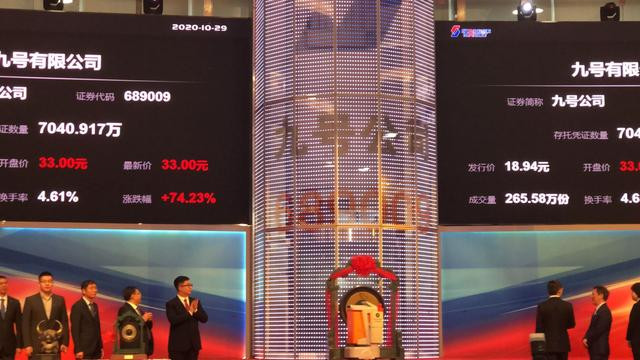Xiaomi-backed Segway scooter manufacturer, Ninebot Limited, sold its first round of Chinese depositary receipts (CDRs) at 18.94 yuan ($2.83) each in its Shanghai Star Market initial public offering Thursday and closed at 38.50 yuan per share.
Mainland regulators set out in early 2018 to use CDRs as a means to allow foreign-registered Chinese incorporated companies to sell shares at home and heating up investment in Shanghai or Shenzhen.
Sensitive industries including telecommunication, technology and media were restricted from receiving foreign investment over the past two decades. The Ninebot CDR listing is seen as the start of a new-style of listing for China, experts say.
It took 524 days for the company to complete the listing proceedings, the longest on record for Star Market-listed companies.
"Newly Sprouted Things"
Ninebot saw the CDRs surging as much as 163% following the company's 1.334 billion yuan ($197.9 million) initial public offering, while China's CSI 300 index edged up 0.75%, according to statistics by Nikkei Asia.
The company originally planned to raise funds of 2.077 billion yuan, according to the initial public offering application file in April 2019. The chairperson Gao Lufeng said the change in fundraising level reflects people's understandable hesitation upon "newly sprouted things."
Like myriad other Chinese technology companies, Ninebot registered its business in the Cayman Islands yet operates business domestically. The company adopted a variable interest entity (VIE) structure, a legal business structure in which an investor has a controlling interest despite not having a majority of voting rights.
Established in 2012, the startup tapped big-name investors such as ShunWei TMT Capital, WestSummit Capital, Sequoia Capital China and pursued capital in the domestic and overseas market after Xiaomi's investment in 2014. In the following year, the company bought iconic U.S. rival Segway, a two-wheeled personal transporter manufacturer.
Bound To Xiaomi
Ninebot claims to have more than 1,000 core patents of human-computer interaction and artificial intelligence technologies. The company concentrates on three kinds of products - smart electric self-balancing scooters, smart electric kick scooters and smart service robots, according to its website.
While the former two products account for 95% in its overall sales, they remain banned on public roads in first-tier cities including Shanghai and Beijing.
Ninebot is the fourth listed company within the Xiaomi ecological chain after Huami, Yunmi and Roborock. Unlike the others, Ninebot plans to remain dedicated to private labeling its products under the Xiaomi brand.
The promotion and sale of Ninebot's two major scooter lines will be "bound" to Xiaomi, according to its prospectus. Although it indicated the risks of such collaboration with Xiaomi, the prospectus didn't suggest possible solutions.
Analysts said their collaboration is based on a profit sharing model, which allows Ninebot to sell products through Xiaomi distribution channels and the two split the income equally. Meanwhile the original product manufacturer (OPM) model secures low rates of inventory.
During the period from 2017 to 2019, Ninebot saw an accumulative loss of over 2.885 billion yuan, according to its prospectus.
Competing in the Fast Lane
The company said the raised initial public offering funds will go to three directions - smart electric vehicles, production of 80,000 non-highway casual vehicles annually and research and development of smart delivery robots.
Electric vehicle rivals Yadea Group, Aima Technology Corporation and Niu Technologies account for nearly 40% of the market share. Analysts say Ninebot faces fierce competition with a higher price than others.
The non-highway casual vehicles are mainly referred to as terrain vehicles with functions of sports, daily use and entertainment, which has been a trend in the U.S. and European market.
Former vice general manager of its rival Zhejiang CFMOTO Power Co., Ltd., which saw a tenfold stock price increase in the past two years, now acts as general engineer of terrain vehicles at Ninebot. Several key research and development members also reportedly worked at CFMOTO Power.
As of Oct. 9, CFMOTO Power has lodged more than 10 legal cases against Ninebot.





